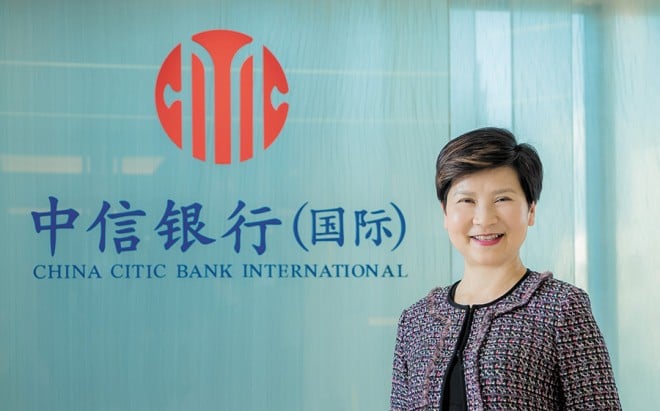
Redefining Banking

[Sponsored Article]
Helen KAN, Executive Director and Alternate CEO of China CITIC Bank International (CNCBI), and the bank’s Group Head, Personal and Business Banking Group, believes FinTech will fundamentally transform the way in which services are delivered. “The future of retail banking is about merging banking into customers’ daily lives,” she says.
Even though Hong Kong is currently one of the world’s foremost financial hubs, Mrs Kan says the city will have to work to sustain its international competitiveness in a future transformed by technology. She therefore welcomes moves such as the recent introduction by the Hong Kong Monetary Authority of the Faster Payment System, which connects banks and stored-value facilities (SVFs) to a new integrated payment platform, enabling instant transfers across banks and the SVF operators.
However, challenges still lie ahead, she cautions. “The battle for talent has intensified. Furthermore, the need to innovate, while at the same time strengthen cybersecurity and compliance, requires major investment.”
Preparing for tomorrow’s world
According to Mrs Kan, CNCBI firmly believes that appropriate investments in FinTech are critical for the bank’s future development and expansion. “We believe this entails an end-to-end transformation of our technology infrastructure, process redesign, customer experience and target-market proposition.”
At a time when consumers are being presented with a multitude of choices by the market, CNCBI is looking to technological solutions to protect and grow its customer base, and to overcome the constraints of physical channels so it can acquire new customers at a faster rate.
“Our approach to transforming banking starts with understanding customer pain points and finding the right technology and process solutions to meet customer needs,” she explains.
Early last year, CNCBI launched its flagship mobile banking platform “inMotion”, which for the first time offers Hongkongers the opportunity to open accounts remotely. “We use Optical Character Recognition (OCR) technology to recognize Hong Kong ID cards, liveness detection technology via ‘selfies’, and we conduct real-time Anti-Money Laundering (AML) checking and ID verification, to enable account opening anytime, anywhere, without the need for a branch visit, address proof or signature.”
The bank has also been making targeted investments in preparing for heightened competition as a result of new entrants of virtual banks in Hong Kong later this year, she adds.
In addition to the technology-driven developments in its retail banking business, CNCBI sees RegTech present numerous solutions which can simplify processes and reduce costs. In the field of commercial and corporate banking, new developments in blockchain applications, and in account opening and account management processes, also promise new opportunities.

The tech shaping banking’s future
The emerging technologies which will have a profound effect on the banking industry can be grouped into an ‘ABCD’ of categories, Mrs Kan suggests: Artificial Intelligence (AI), Biometrics, Cloud and (Big) Data.
“Integrating AI and Robotic Process Automation (RPA) technology into our business enables the bank to save time and money by automating high volume and repetitive tasks such as account opening, AML checking and user acceptance testing,” she points out.
In traditional banking, customer authentication relies on the physical presence of the customer at a branch, a signature on paper or the input of a password. Whereas, in the digital world, the deployment of mature biometrics solutions at customer touch points, such as via mobile banking, can improve the user experience. “Upon registration, customers will be able to access their banking applications without having to memorize and input various logon IDs and passwords.”
Cloud computing offers the possibility of a more cost-effective infrastructure design model. “Nevertheless, before implementing such emerging technology, various factors such as data security, governance and controls, must be considered and addressed thoroughly,” Mrs Kan notes.
While it is now widely accepted that the effective collection and utilization of data is becoming crucial to future business success, sophisticated and systematic analysis of data help us to formulate new insights about customers, thereby driving new products and services. It also facilitates us to adjust our risk appetite and enhance our fraud monitoring capabilities.
Realizing the possibilities
Mrs Kan believes the sustainable development of FinTech requires a good regulatory framework, the ability of academia and industry to develop and attract talent, faster development of important infrastructure and continuous innovation of financial institutions. Given these preconditions, she sees the Greater Bay Area present Hong Kong with massive opportunities to innovate new financial solutions.
Mrs Kan, who is also a Council Member of HKUST, suggests to realize these opportunities ahead, Hong Kong’s higher education system needs to develop a generation of leaders who are not only steeped in the Science, Technology, Engineering and Mathematics (STEM) subjects, but who also possess an ‘ABCD’ - Ambition, Belief, Creativity and Determination – DNA. “All students should collaborate more with industry and understand the best practices used outside Hong Kong,” she adds.
“In our journey to create the ‘future of banking’, we have in fact partnered with HKUST through the CEMS Program.” The CEMS is a global alliance linking leading business schools and multinational companies around the world, and CNCBI-promoted studies on direct banks and the migration of transactions to digital channels are already underway. This is only the beginning, however. “More collaboration opportunities definitely exist.”